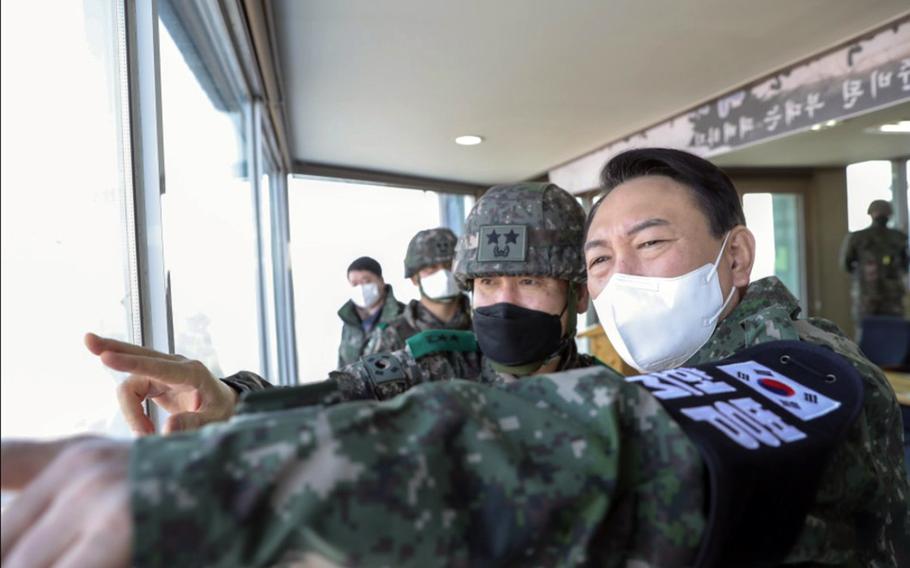
Then-South Korean presidential candidate Yoon Suk Yeol visits a military base at the Demilitarized Zone between North and South Korea, Dec. 20, 2021. (People Power Party)
CAMP HUMPHREYS, South Korea — South Korea’s National Security Council will move to suspend an inter-Korean peace agreement days after the North sent nearly 1,000 trash-carrying balloons over the shared border, according to local media.
The council — the intelligence department that reports directly to South Korea’s presidential office — announced it would move to suspend the Comprehensive Military Agreement during a cabinet meeting Tuesday, the Yonhap News Agency reported Monday.
The plan would entirely suspend the accords “until mutual trust between the two Koreas is restored,” according to a presidential office news release cited in the report.
“This measure will enable military training near the Military Demarcation Line, which has been restricted by the agreement, and allow for more adequate and immediate responses to North Korean provocations,” reported Yonhap News, citing the release. “The government will take all necessary measures to protect the lives and safety of our citizens.”
The presidential office did not immediately respond to a request for comment by phone Monday.
The Comprehensive Military Agreement was signed Sept. 19, 2018, by North Korean leader Kim Jong Un and then-President Moon Jae-in during their summit at Pyongyang.
The accords were meant to prevent military conflict by establishing no-fly zones on the Military Demarcation Line separating the two Koreas as well as prohibiting armed troops along the border. The line runs through the Demilitarized Zone and marks the actual border between North and South Korea.
Efficacy of the agreement has waned following military tensions within the past year.
Hours after North Korea successfully placed a satellite into orbit on Nov. 21, Seoul announced it would partially suspend the agreement and restart aerial reconnaissance operations at the border.
Intelligence agencies from the United States and South Korea have argued that the North’s satellite launches use ballistic missile technology and violate U.N. Security Council resolutions prohibiting the communist regime from conducting such tests.
Three days after that launch, the North’s state-run Korean Central News Agency reported the country would withdraw from the inter-Korean accord entirely and “deploy more powerful armed forces and new-type military hardware” at the nearly 150-mile-long border.
North Korea launched a barrage of ballistic missiles in six separate days of testing so far this year and a rocket carrying a military satellite on May 27. That launch ended in failure, scattering debris across the Yellow Sea, according to South Korea’s military.
Pyongyang also sent roughly 980 balloons carrying plastic bags of trash to several South Korean provinces in the previous week; the bags contained manure, scrap paper, batteries, cigarette butts and other household trash, according to the South Korean military.
The balloons were sent in retaliation against South Korean human rights activists who floated their own balloons across the border, according to KCNA. Activists in South Korea frequently send money, household goods and anti-North Korean leaflets in hopes that they reach North Koreans.
North Korean Vice Defense Minister Kim Kang-il said Pyongyang’s halted its balloon campaign after the South experienced how “unpleasant” it is to clean up, according to a KCNA report Sunday.